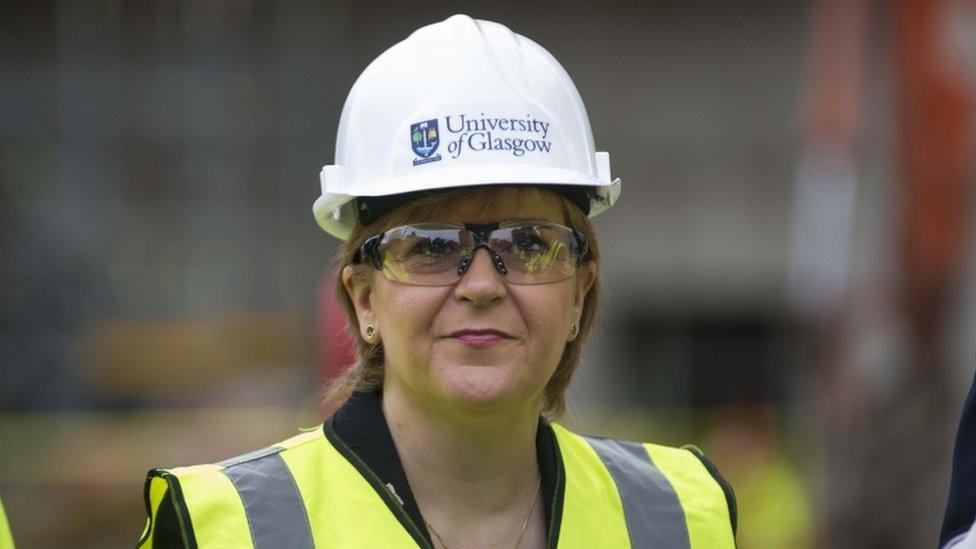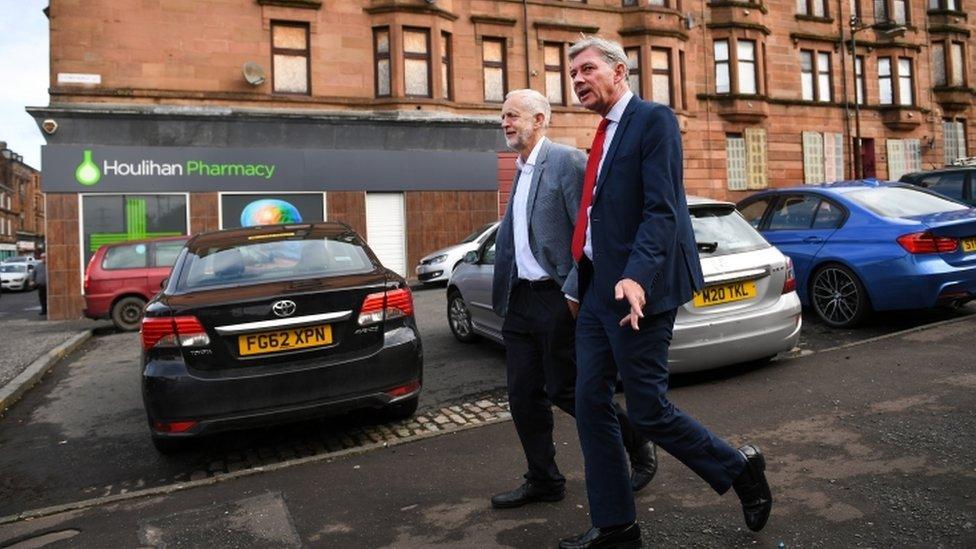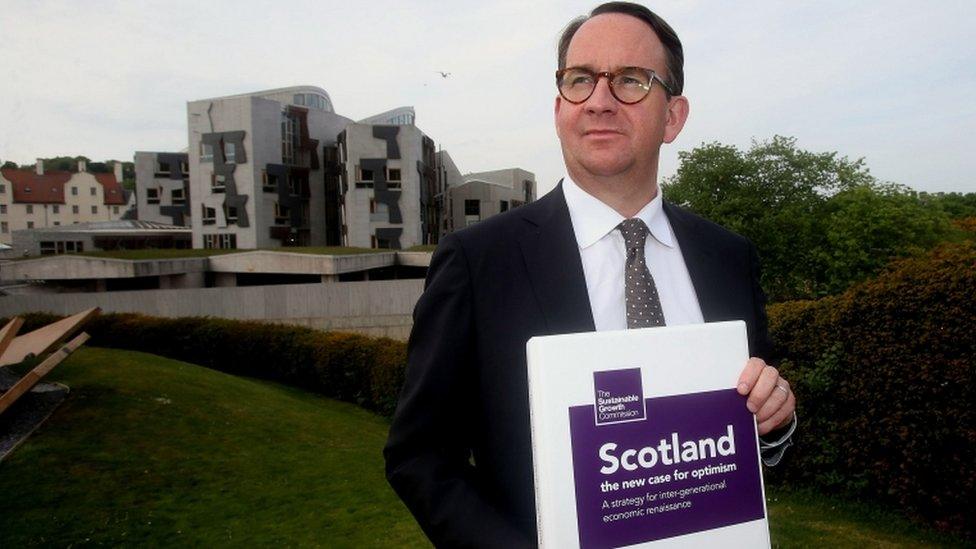Gers: One report, many interpretations
- Published

It is a given in politics that our elected tribunes will cleave to descriptions of contemporary life which best accord with their own, predisposed outlook.
Still more is this true of unelected tribunes, of those who are seeking our support and endorsement.
If they cannot adapt their policies to prevailing circumstances - aren't manifestos, leaders and party zealots such a nuisance - then they will seek to shape and mould the environment, to convince us that their predetermined ideological position is a neat match with the facts as they depict them.
Such is, annually, the case when the Gers report is published. That is, the survey of Government Expenditure and Revenue Scotland, on this occasion covering the fiscal year 2017/18.
Glance, for example, at the comment by Richard Leonard, he who would be first minister in Labour's colours.
Mr Leonard has read the Gers report, available to us all. His unqualified conclusion? Apparently, the Gers figures tell us that Scotland needs a Labour government. By which, I presume, he refers to governance at the UK level.
He envisages Jeremy Corbyn - whom he is presently accompanying around Scotland - gaining UK power and thus setting about a programme "to end austerity and invest instead."
The Greens? Scotland's ecological party leaders conclude that the lesson of Gers is that we should end our reliance upon oil and gas - while moving to a "clean economy."
Today's figures are better than last year's, at least in terms of the overall balance, partly because of a £1bn increase in the take from the North Sea. Despite that, the Greens argue that such returns are precarious and environmentally damaging.
Turn away from elected politicians and scan the comments from CBI Scotland. Their director Tracy Black says the Gers figures show that we need enhanced support for the private sector to grow the economy.

Nicola Sturgeon welcomed the improved Gers figures during a visit to the University of Glasgow on Wednesday morning
Incidentally, I raise no complaint whatsoever about the faintly parti pris tone of such comments. It is entirely understandable that organisations should seek to pursue their distinctive agendas.
And, of course, such an approach is also evident in the views offered from the two sides of the fault line which defines Scottish politics, the choice between independence and the Union.
With one very significant and distinctive difference, this time around. Which is that the Gers figures were accepted by the SNP's Sustainable Growth Commission as the starting point for future calculations, including in the event of independence.
To be clear, Scotland's two governments read very different things into today's report.
Shrinking deficit
Nicola Sturgeon sees Scotland's public finances "continuing to improve". She notes an increase in both onshore and offshore revenue, with a further statement from the SNP highlighting that lift in the North Sea.
Ms Sturgeon also points to a shrinking deficit, alongside that rise in revenue. She adduces other evidence such as relatively high growth, by comparison with that of the UK, in early 2018, to conclude that "Scotland is on the right trajectory".
By contrast, David Mundell, the Scottish Secretary, notes that Scotland's deficit as a share of GDP is 7.9% - while the comparable UK figure is 1.9%.
He notes further that Scotland contributed 8% UK tax while receiving more than 9% of UK spending.
These are decidedly familiar arguments, on both sides. Mr Mundell posits the Union as a cosseting defence for Scotland. Ms Sturgeon says that Scotland's underlying economy remains fundamentally strong - but could be better still.
Which brings me back to the Sustainable Growth Commission, chaired by the former SNP MSP Andrew Wilson.
In essence, he and his fellow members challenged the SNP and Scottish Ministers to grasp, to absorb fully the extent of the deficit in Scotland, both in absolute and relative terms.

Jeremy Corbyn is currently touring Scotland alongside Scottish Labour leader Richard Leonard
The previous SNP approach to Gers featured a range of elements. As with every other party, they would focus on the bits they liked. They would tend to deride or minimise the bits they disliked. I stress, as with every other party.
And, more generally, they would argue that, if the Gers figures were gloomy, then the blame lay with the Union. This economic performance happened on London's watch.
There is still a fair touch of that around, although it is modified somewhat by Holyrood's newly acquired fiscal powers. Economic clout is now more evidently shared although not, of course, as the SNP would wish.
But one detects a change in tone too, accompanying the Wilson report. In essence, he and his fellow commissioners say: "Ok, there is a deficit. These things, how sad. Get over it and move on to try to sort it."
Context to the figures - The gap between Scottish and UK spending per person has increased since 2014-15. This is in part due to Scottish government capital borrowing powers which began in 2015-16. In addition, water and sewerage services are provided by the public sector in Scotland, and therefore included in Scottish expenditure. In England and Wales they are operated by the private sector and therefore excluded from UK expenditure.
The Growth Commission report says, explicitly, that the Gers figures should be accepted "as our starting point." They were talking at time of publication of the 2016/17 report but the principle applies.
They note further that the aim is to project forward, leaning upon analysis provided by, among others, the Institute for Fiscal Studies, John McLaren's Scottish Trends and the Fraser of Allander Institute. (All three have commented or intend to comment today.)
The purpose of this acquiescence is two-fold. One, to pre-empt a "numbers game" fight over Scotland's current economic standing. Just accept Gers.
And, two, to provide a basis upon which to construct proposals for remedying the issues identified by Gers, through growth, exports and migration among other matters.

Andrew Wilson used the Gers figures as the starting point for his Growth Commission report for the SNP
On this topic, the commission concludes: "What is undoubtedly true is that the current position of the country's public finances is an imperative for change rather than staying the same."
This is, I would argue, more than just a nuanced version of the old "blame the UK" approach. It is more about accepting the relative challenge implicit in Scotland's present status - alongside the advantages and potential identified by ministers from both the Scottish and UK governments.
I expect this approach to set the template for future pronouncements from the first minister and her Holyrood colleagues. This has two direct consequences.
One, it can feed in - it is already doing so - to the Brexit debate. Derek Mackay, the Scottish finance secretary, amplified comments by the first minister when he argued that export success - a key plank of the commission package - was "directly threatened" by any version of Brexit which involved leaving the single market.
Referendum victory
Two, it may prove influential in the question of whether there should be a second independence referendum in the near future.
I have argued here ad nauseam (for which, apologies) that Brexit provides the possible trigger for indyref2 (given Scotland's majority views on the EU) - but that the very uncertainty created by Brexit might run counter to the prospect of a referendum victory for those who support independence.
The Gers figures and, more especially, the Growth Commission analysis, contribute to that - although, again, they create a potential dichotomy.
Even accepting the Gers calculations, there will be those who will argue that Scotland's position requires urgent remedy through the establishment of an independent state.
But there will be those inside the Indy camp who will argue for continuing caution. To be clear, Nicola Sturgeon and her colleagues continue to advocate independence with vigour and consistency. They yearn for it.
But her statement on Gers today referred more to the immediate issue of Brexit, than to independence per se.
Yes, she alluded to a further transfer of fiscal clout, noting "the limited economic powers" currently at the disposal of the Scottish Government.
But her primary message and that of Derek Mackay was the need to forestall a "hard Brexit", defined as leaving the single market.
It is possible to view this in terms of a slow boil. Accept the Gers figures while spotlighting the existing and potential strengths of Scotland's economy.
Fight the case for the single market - while the detailed terms of Brexit are still being negotiated.
Meanwhile, discuss and debate the conclusions of the Growth Commission within the SNP and the wider movement. The party has called three National Assemblies on the subject, starting this weekend.
Does any of that sound to you like rushing to an early demand for an immediate referendum on independence? No, me neither.
I believe, however, that Nicola Sturgeon will still deliver an update on the issue in October. To be pedantic about such matters, she actually promised such a statement when there was clarity about Brexit - which she presumed would be by the autumn of this year.
However, matters move on and there is now a clear expectation of such an update. I think it likely that by October Ms Sturgeon will simply say that Brexit continues to lack clarity - and that she will continue to assess the issue of Indyref2.
The focus, meanwhile, will be those two factors identified above: fight the case for particular Brexit terms; examine and rethink the SNP's economic policy, including such matters as the currency.